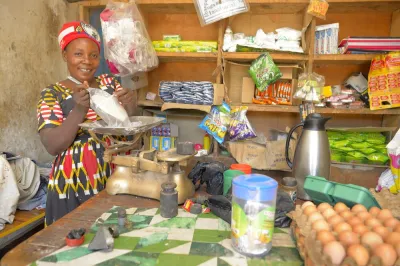WhatsApp and Algorithms: How to Get Financing to Farmers in East Africa

Bram Willem van den Bosch is the CEO and co-founder of digital agricultural lender Emata. He has over ten years of experience in finance and technology. Bram held various roles for UBS and ING Bank in investment banking and asset management in the Netherlands, Russia and Switzerland, including four years of agriculture financing in emerging markets. Prior to founding Emata, Bram was the Managing Director of the financial technology company Laboremus Uganda which creates financial technology solutions for banks in Europe and East Africa.

Lillian Nassanga is the Product Manager of Emata. She has over six years of experience in software development, five of them in fintech. Before making the switch to Product Manager, Lillian was a senior software developer.
FinDev Gateway: In Sub-Saharan Africa, agriculture accounts for about 60 percent of employment and 18 percent of the GDP, but only 3 percent of the lending. How do you explain this gap? How did it inspire you to create Emata?
Bram Willem van den Bosch: There are a number of reasons behind the lending gap for farmers in East Africa. First of all, the eligibility and underwriting standards are too strict. Banks in Uganda and across East Africa require registered collateral and a formal proof of income, two documents that most smallholder farmers are unable to provide since they are self-employed. And then there is the problem of efficiency. Most banks in the region are not efficient enough to make a profit from the smaller loans that farmers need, and they also take too long to approve loans. Often, farmers will not receive the money for a loan they requested until long after the season is over.
We saw some of these problems first-hand when we worked at Laboremus Uganda, a software company that creates financial technology for clients in East Africa, before creating Emata. We spent a lot of time trying to get banks to go digital and to innovate so that they could reach clients in rural areas. However, the efforts proved frustrating, and after a few years, we decided to take on this challenge ourselves by creating a new fintech company that would focus on reaching farmers and their cooperatives. That’s how Emata was born in 2017. In order to achieve the efficiency needed to work with this sector, we opted for a low value - high volume model, which is perfect for automation.
FinDev: Emata offers affordable loans to farmers who are members of cooperatives or aggregators, combining cooperatives’ data with advanced risk analytics to make sure that each of the farmers are offered tailored loan products. Could you tell us more about this alternative credit scoring?
Bram: As we mentioned earlier, one of the main reasons banks struggle to serve farmers is their strict eligibility standards. Our alternative credit scoring model helps to solve this problem and is one of the most important pillars in our company.
There is no single answer as to how we do this because our credit scoring algorithms differ depending on the type of farming. For dairy farmers, for example, we track settings such as delivery records, whereas for coffee farmers or other crops we look more at the characteristics of the farmland.
Rather than using collateral to determine who can borrow, we use data science. It’s not about having a big farm or having all the documents, it’s about what we can see in the data: is this farmer reliable?
FinDev: Besides the individual farmer financing, you also provide a software that helps cooperatives and aggregators manage their day-to-day operations better. How does this software help them?
Lillian Nassanga: Emata provides a data collection tool that helps cooperatives and aggregators keep track of the supply they receive from farmers, set prices for products and manage payments to and from farmers for different services. The system helps maintain transparency by sending out automated SMSs between the farmers and the transporters that are delivering milk to the cooperatives, with the delivery’s quantity and price information. Farmer payment sheets are generated automatically, saving our partners a lot of time, as it used to take them three to four full days every two weeks to calculate how much each farmer should be paid.
Beyond the day-to-day management, Emata also provides cooperatives and aggregators with performance data, so they can get a high-level view in real time of how they are doing as an organization. The dashboard can show them overall production numbers, which farmers are producing the most, and which periods of time have more deliveries. Previously, this type of data could take a long time to gather and analyze, and necessary decisions could be delayed. Now, with the availability of data from our system, cooperative board members can make decisions on where they need to invest more as an organization, such as in more coolers for dairies or in opening new regional hubs.
FinDev: You provide this software for free. What is your business model?
Bram: In the region, the market for software is much smaller than the market for loans. The IT budgets of most Institutions limits the amount of money they can spend on software. At the same time, people in rural areas are used to paying incredibly high interest rates on loans. So our business model tries to kill two birds with one stone - solving both of these problems at once. By offering loans at much lower interest rates, we help solve the problem of high interest rates in rural areas. We are able to make a profit by reaching scale with a high volume of loans. And by including our software for free, we ensure that every party we work with can use this tool, even if they couldn't afford to buy it.
FinDev: What were the key challenges you faced in developing Emata?
Lillian: We learned a lot from our first pilot, because we developed it thinking as a fintech, without considering the needs of the consumer. We built an app that was too heavy, requiring special installation and training. We realized quickly that we needed to simplify and rely on apps that our clients already knew how to use, like WhatsApp. Through partnerships with cooperatives and aggregators, we were able to learn more about our potential clients’ behaviors and make the needed adjustments.
Lack of access to smartphones and the internet has also been a challenge. To work around the lack of smartphones, our partners (cooperatives and aggregators) help coordinate with the farmers, who rely on SMSs. To address the connectivity issues in rural areas, we had to innovate to allow the application to work offline as well.
Another challenge we faced was that some cooperatives did not have all the hardware required to take advantage of the software. As a result, we had to work with partners to provide hardware to these cooperatives and support them as they began to use both the hardware and the software.
FinDev: You won CATAPULT: inclusion Africa 2021 from The LHoFT and you have been selected for the Silicon Valley-based accelerator program Plug and Play. What is coming next and what do you see as key priority areas for Emata?
Lillian: A lot of things are happening. First of all, we are professionalizing our funding base to attract commercial equity and depth which will help us accelerate our growth as a company.
We are focusing on three goals to support our growth:
- We will continue our rollout into dairy. Last month, we opened our first regional office in the southwest region of Uganda, where we have more than a hundred cooperatives waiting for us, and we would like to do the same across the country. We are currently working with 15 milk cooperatives and there are about 400 cooperatives in Uganda.
- Next year, we will extend into crop farming. We have partnerships in the pipeline to start working with oil seed farmers, corn farmers and coffee farmers.
- Looking farther into the future, we aim to expand in other countries in East Africa. But we will keep that for 2023!



EMATA seems to solve many financial problems facing farmers in my country would you kindly please let me know if my country can be supported on the scheme of lending seed money,
Emata is really improving farmers' lives in Uganda..
Financing of small scale farmers has been made easy.
With the presidential initiative of farmers working together in cooperatives,I see this as a stepping stone.
Thank you Bram William for Emata.
Congratulations to Bram Willem and his team. We would like to implement their business model in Togo (W.Africa), could you connect us with them for more exchange? My name is Kossi KOUDAHENOU and I am an Executive Director of a Consulting Business in Togo (Transatlantic Knowledge Transfer - Consulting).
Leave a comment